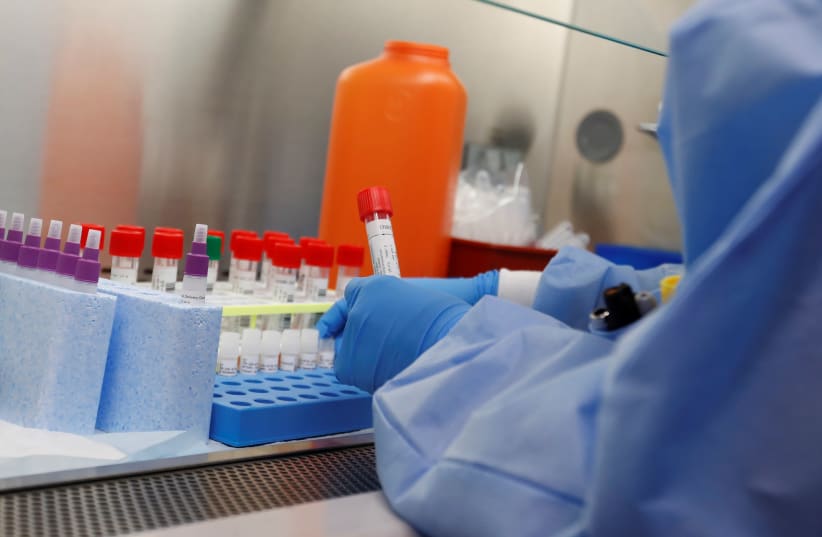Usually, the Health Ministry approves treatments through a long process that can last up to a year or longer. The ministry often checks to see if the treatment has already been approved by the Food and Drug Administration.
Other countries have approved these treatments as well.
The first treatment is Chloroquine, a medication that has been used for over 70 years to treat malaria and rheumatic illnesses such as lupus and arthritis. The bus driver who was infected with coronavirus and recovered is being treated with this medication along with other anti-viral medications.
Remdesivir, the second treatment approved, is still in the first stages of human testing and results will be available within a number of weeks, according to Ynet. Experiments with the drug began in China, the USA and additional countries, even on some severely ill patients in Israel, including the bus driver who was hospitalized in the Puria Medical Center in Tiberias. The driver saw a dramatic improvement and was even taken off a respirator.
The treatment may slow down the spread of the virus and may even stop the virus from multiplying in the body. The virus has been shown to work against MERS and SARS, viruses related to the novel coronavirus. Remdesivir succeeded in preventing monkeys from being infected with MERS in trials and led to an improvement in those who were already infected. The drug has also shown promising results against a variety of other viruses.
Kaletra, the third treatment approved, is an anti-viral medication that combines two anti-viral "protease inhibitor" medications that prevent the multiplication of HIV. The virus is already used to treat those who are carrying or ill from AIDS.
Rezolsta, the fourth treatment, is an anti-viral medication used for carriers of HIV. The medication blocks protease enzymes which are necessary in order for the AIDS virus to duplicate. Once the enzyme is blocked, the virus does duplicate correctly. When the medication is taken with other HIV medications, it lowers the number of virus cells in the blood and keeps it low.
Xofluza, the fifth treatment, is an anti-viral medication used to treat the flu in those that are seriously ill due to complications caused by the flu. The drug inhibits a protein called endonuclease that is needed for flu to duplicate. Research has shown that it may help fight the coronavirus, according to Ynet.
Favipiravir, the sixth treatment, is an anti-viral medication used to prevent the duplication of the coronavirus. The drug is used different RNA-type viruses, similar to the coronavirus, and is part of a number of tests throughout the world with good initial results.
Hyperimmune globulin, the seventh treatment, is a vaccine containing antibodies against foreign entities. The antibodies are the first line of defense which signal to the immune system to attack the foreign entity. Hyperimmune globulin includes antibodies that should hone in on the coronavirus after it enters the body and signal to the white bodies to attack it.
Interferon alfa-2b, the eighth treatment, is a medication used to treat those ill with Hepatitis B and C, leukemia and other illnesses. Interferons are proteins secreted in response to infections which activate components of the immune system that attack the viruses and get rid of them.
On Monday, the Health Ministry bought 20 million swabs meant to test for the coronavirus, but Israeli companies have refused to produce the fluid required for the test, which could negatively impact the country's efforts in identifying and fighting the virus, according to Channel 12.
A coronavirus test has three parts: a swab used in the throat of someone suspected to have been infected to take a sample, a test tube in which the swab is placed and a special fluid within the test tube that preserves the sample until it arrives at the lab.
The Health Ministry managed to acquire the large number of testing swabs, but negotiations are ongoing with two Israeli companies that are meant to provide the fluid for tests, but, for a variety of economic reasons, have refused to do so.
"I know the names of these companies," said Professor Gabi Barbash, former Director-General of the Health Ministry, according to Channel 12. "They have until tomorrow to give a response."
The World Health Organization called on all countries on Monday to ramp up their testing programs as the best way to slow the advance of the coronavirus pandemic, and also urged companies to boost production of vital equipment to overcome acute shortages.
"We have a simple message to all countries - test, test, test," WHO Director General Tedros Adhanom Ghebreyesus told a news conference in Geneva. "All countries should be able to test all suspected cases, they cannot fight this pandemic blindfolded."
Without testing, cases cannot be isolated and the chain of infection will not be broken, he said.
Tedros said on Monday the strategy to contain the disease - identifying people with infections and rapidly isolating them - was still the best approach, and had shown positive effects in China, South Korea and Singapore.
Many countries have limited testing to the old or with pre-existing conditions, refusing tests for others with milder symptoms who can nevertheless spread the virus. Often they simply do not have the resources to carry out more tests.
Reuters contributed to this report.Tedros said the WHO was working with the private sector to increase production of protective equipment, describing the current shortage as a "market failure."
